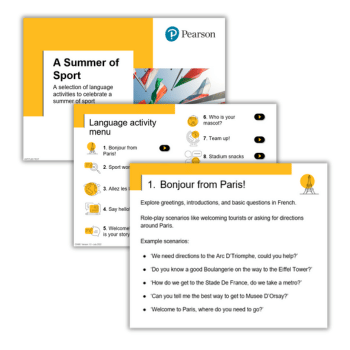7 Quick MFL Ideas to Boost Secondary Students’ Word Power

Try these simple strategies from Dominic McGladdery to help your pupils learn – and remember – the vocabulary they need for success…

Like anything in life that is worthwhile, learning a foreign language is hard work. And acquiring vocabulary is particularly tricky, especially if you are a child who is not used to having to remember things – relying on looking them up online, instead.
It’s going to take time, commitment and patience. However, it definitely doesn’t need to be boring for the student or teacher, so here is my guide to helping language learners boost their word power, without putting in too much effort….
1 | Use what they know
When introducing vocabulary, include a lot of cognates and near-cognates. This will help to boost the students’ confidence in their own abilities as linguists. For example, the French word ‘un sofa’ is much easier to learn and retain than ‘un canapé’.
2 | Keep repeating
Repetition is a great way to learn and retain vocabulary. After all, that is how we all learnt to speak English. Get students to speak to you and to each other, as much as possible in the target language; think of all of the times you speak English in your classes when you really don’t need to. Sometimes, I will put slips of paper in my pockets with key vocabulary on them. I pick one out, describe it, and ask the students to guess which one it is. It’s a great way to practise individual words and has a competitive element to it.
3 | Face the music
Singing is such a good way for students to learn to pronounce basic vocabulary. You don’t need to be the world’s greatest singer, either. There is a cornucopia of foreign language learning songs on YouTube. You could even get pupils to write their own lyrics to popular songs. I find that learners are more likely to join in with songs than with other speaking activities, too.
4 | Don’t overload them
Little and often are the watchwords here. One of the worst things I have seen MFL colleagues do in the past is give students too many words to learn. American psychologist George A Miller’s ‘Magic Number Seven’ (plus or minus two) idea, is a good rule of thumb. In 1956, Miller found that people can generally only keep between five and seven items in their short term memory. He also discovered that we are better at remembering short words and numbers, as they have fewer syllables. I tend to ask students to learn lists of around ten words at a time – but I make sure that I include some cognates.
5 | Quiz, don’t test
Testing vocabulary can be demotivating for many students and is one reason that many will want to give up languages at the earliest opportunity. I always make sure that tests (or quizzes) have a part where the student has to write some English words. Scrapping the idea of a pass mark will also help. If failure is not possible, confidence and performance will improve. Also, providing time in lessons to learn vocabulary could prove to be motivating.
6 | Teach dictionary use
Using a dictionary is one of those things teachers just assume students can do – but often they will not have been taught the skill, so it’s worth you spending some time on it. Once they can use a dictionary properly, they can find their own vocabulary and not be limited to your lists or the back of the textbook. I also like to play dictionary games with students – for example, asking them to find five animals that could be kept as pets.
7 | Don’t compartmentalise
Revise and revisit vocabulary regularly, so that students become aware that it can be used in different situations. For example, I am using prepositions with my Year 7 class to describe where places are in a town; a few weeks ago, they used them to describe items in their houses.
Dominic McGladdery is a blogger and teacher of French, German and Spanish with over 20 years’ experience. Find him at domsmflpage.blogspot.com and follow him on Twitter at @dominic_mcg.











